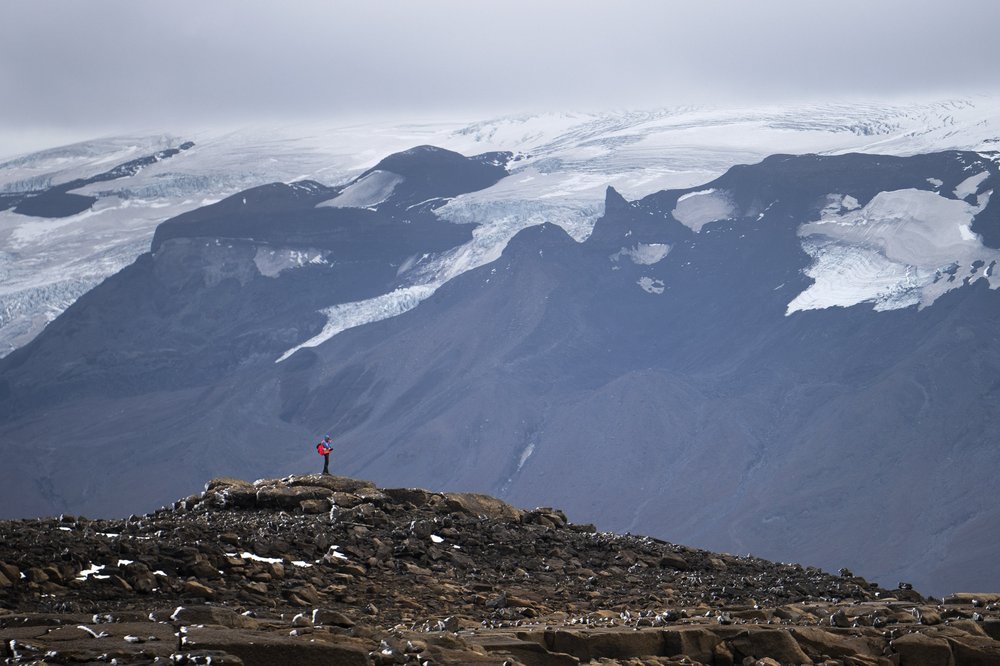ICELAND: Scientists bid farewell to Okjökull, the first Icelandic glacier lost to climate change. A demonstration on Sunday took place at the former site of the glacier, which once spanned six square miles and has since been renamed as “Ok.”
Many Icelandic officials, activists, and researchers came together to say goodbye and demand action towards fighting climate change. The mock funeral included a poetry reading, moments of silence and political speeches.
Attendees held up signs calling climate change a crisis and urging world leaders to declare it an emergency. “I know my grandchildren will ask me how this day was and why I didn’t do enough,” 17-year-old Gunnhildur Hallgrimsdottir told The Associated Press.
Icelandic Prime Minister Katrín Jakobsdóttir said, “We have no time to lose.” The former Irish President Mary Robinson also issued a statement and said, “The symbolic death of a glacier is a warning to us, and we need action.”
Here are some of the potential hazards:
It can displace people
By 2100, up to 2 billion people — or about a fifth of the world’s population — could be displaced from their homes, and forced to move inland because of rising ocean levels, according to a 2017 study.
Bangladesh is, particularly at risk. About 15 million people in the country could become climate refugees if sea levels rise 1 meter or about 3 feet. And more than 10% of the country would be underwater.
Some of the people who are displaced might not have anywhere to go. They’re not protected by international laws, so industrialized countries aren’t legally obligated to grant them asylum.
It can put some islands underwater.
If sea levels continue to rise at a rapid rate, some remote island nations would be at risk of disappearing, including Tuvalu, the Maldives, and the Marshall Islands.
It can diminish drinking water.
Millions of people depend on glaciers for drinking water, particularly in the Hindu Kush Himalayan region and the Andes Mountains.
In dry climates near mountains, glaciers collect precipitation and fresh water and store it as ice during colder months. When summer comes along, the ice melts and runs off into rivers and streams, providing drinking water.
A world without glaciers would threaten that water supply and potentially have devastating effects, Jason Briner, a geologist at the University of Buffalo, told CNN.
It can threaten our food supply.
Melting glaciers also threaten the food supply. Rising sea levels contribute to warmer global temperatures, changing what kinds of crops farmers can grow. Some climates will become too hot for what farmers are growing now. Other climates will see more flooding, more snow or more moisture in the air, also limiting what can be grown.
As a result, food will become scarcer, grocery prices will spike and crops will lose their nutritional value, as the UN Intergovernmental Panel on Climate Change noted in a report earlier this year.
It can cause a health crisis.
As sea levels rise, coastal communities are more susceptible to flooding. One particularly gross consequence of that flooding is the impact on sewage treatment plants, which are often built at low elevations close to the oceans.
Floods can cause massive amounts of untreated sewage to flow into rivers, streams, streets and even homes. That pollutes sources of water, harms wildlife and helps spread diseases.
“A lot of times when people think about sea-level rise, they think about the inundation of land,” Andrea Dutton, a geology professor at the University of Florida, told CNN. “They think that ‘If my house isn’t in the area that’s flooded, I don’t need to worry about it,’ which is a complete misconception.”
It can disrupt the global economy.
More than 90 percent of the world’s trade is carried by sea, according to the United Nations. So, there’s a good chance that most of the things you buy have passed through at least two ports: one during export and one during import.
Ports are critical to the global economy, providing jobs in industries like shipbuilding, fishing, seafood processing, and marine transportation. Rising sea levels could damage the infrastructure of many ports and disrupt all kinds of processes, creating a ripple effect throughout the economy.
“[Melting glaciers] will affect people’s access to food, water, and energy, which are fundamental, critical things that we need to survive,” Dutton said.
It can change life as we know it. The large ice sheets in the Arctic and Antarctic are part of Earth’s energy balance, Briner said.
(Agencies)









Comment